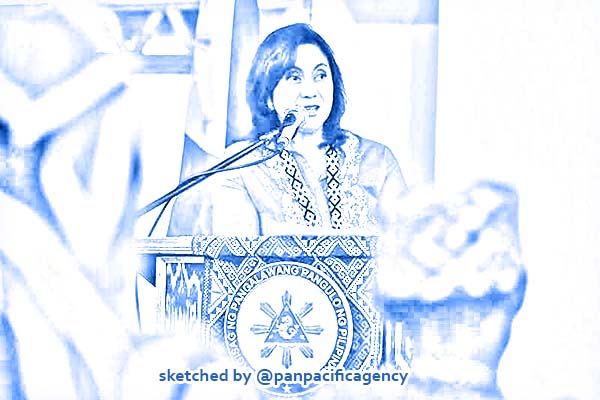Philippine vice-president Robredo lost post due to request for drug war docs, intel

Vice President Leni Robredo yesterday expressed gratitude to US ambassador to the Philippines Sung Kim for his commitment to partner with the government in efforts to eradicate illegal drugs. Facebook/Leni Robredo. Sketched by the Pan Pacific Agency.
MANILA, Nov 19, 2019, Rappler. Despite earlier assuring Vice President Leni Robredo that she would have access to documents and intelligence reports related to the government’s anti-drug campaign, Malacañang is now saying that Robredo’s requests for such were among the things that prevented her from being part of President Rodrigo Duterte’s Cabinet, Rappler reported.
Presidential Spokesperson Salvador Panelo said on Tuesday, November 19, that Robredo’s “insistence” on getting access to information “added to Duterte’s reconsideration of his earlier desire to appoint her in the Cabinet.”
Panelo claimed that Robredo’s request for such information could “imperil the welfare of the Filipino people and the security of the state.”
“Being a member of the Cabinet gives Ms Robredo unlimited access to sensitive state matters which if transmitted by her whether purposely or otherwise could result [in] adverse consequences,” Panelo said on Tuesday.
Yet just hours after Robredo accepted her new post as co-chair of the Inter-Agency Committee on Anti-Illegal Drugs (ICAD), Panelo had said that access to such information goes without saying.
“Of course, she is the co-chair. Why should she not have access? We will give her all the support. Being a member of the Cabinet, it behooves all of us to help each other,” Panelo earlier said.
Asked back then if the Vice President would also get intelligence reports, Panelo likewise said, “Of course, she will.”
Asked again on Tuesday if Robredo would still get access to information, Panelo said, “Wala (None).”
Why does this matter? Robredo’s position has been tenuous since Duterte threatened to fire her after he made it clear she could not aid investigations that are against him.
Malacañang continued to expound on this on Tuesday, saying that Robredo’s meetings with foreign institutions and personalities who have “prejudged” the Duterte administration’s campaign “did not sit well with the President.”
Panelo labeled Robredo’s request for access to information, along with consulting representatives of the United States and the United Nations Office on Drugs and Crime, as “missteps” and “red signs” that “could not be ignored.”
Malacañang claimed that giving Robredo access to information on all state matters could lead to “adverse consequences, especially since the VP has the tendency to be generous with acquired information and knowledge to others whose predilection may not be in the best interest of the country.”
These prompted Duterte to backtrack from his previous promise to make Robredo a Cabinet member.
What can Robredo do now? While she was assured of access to information in the beginning, Malacañang’s latest statements mean another obstacle for Robredo’s post in the anti-drug campaign, which already had undefined powers from the beginning.
Despite this, Panelo sees no reason why Robredo’s ability to perform as ICAD co-chair would be diminished. He argued that Robredo does not need classified information and should focus on crafting her new anti-drug programs.
“The problem confronts us in the eye…. She knows that already,” he told reporters in a phone interview.
Asked if this meant Duterte did not trust Robredo with classified matters, Panelo said she is in a compromising position.
“Since she has talked with certain institutions and people that are supposed to be enemies of the state, to the mind of the President, that’s a dangerous sign. You may not be doing it purposely, but delikado (it’s dangerous),” Panelo said.
Under Duterte’s orders, law enforcement agencies have long blocked human rights advocates, lawyers’ groups, and even the constitutionally established Commission on Human Rights from obtaining documents related to the drug war.